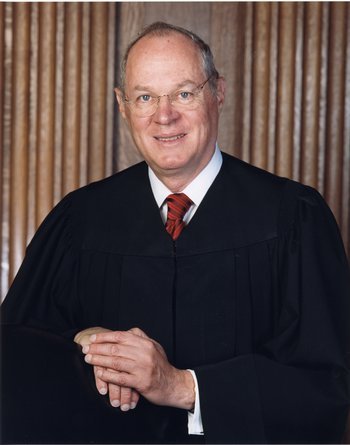When Will Justice Anthony Kennedy retire?
CNN/Stylemagazine.com Newswire | 4/11/2017, 11 a.m.
(CNN) -- With Justice Neil Gorsuch sworn in and the Supreme Court's 422-day era-of-eight over, attention has turned to Anthony Kennedy, the jurist who administered Gorsuch's oath at the White House ceremony and on whose key vote the law in America has long turned.
Justice Kennedy, 80, has been mulling retirement. Former law clerks and others close to him say he is privately vowing to step down in the next few years. The centrist conservative is the court's most vacillating, agonizing, justice, and he is likely balancing his oft-voiced sense of judicial mission with the realities of age.
Whether he will leave this summer when the current term ends, or continue serving, is not easy to predict. But it will matter.
Kennedy has cast the decisive vote on high-profile cases for more than a decade, upholding abortion rights, ensuring campus affirmative action, and declaring the constitutionality of same-sex marriage. In recent years, he has moved to the left on racially inflected disputes, casting the key fifth vote for broad federal coverage against housing bias in 2015, and new constitutional protection against racism in jury deliberations just this March.
As evident in his brief remarks in the Rose Garden Monday, Kennedy speaks in exalted terms about America's constitutional democracy. He is equally earnest about his individual role, routinely asking himself, he says: "Why am I about to rule the way I am about to rule?"
When I asked Justice Kennedy a few years ago about his retirement thinking, he answered first by talking about his place in the so-called "Silent Generation," that group of people born between 1925 and 1945, who did not see anyone among them become president of the United States.
He said it was important to stay on the bench as long as he was able "because my generation didn't have a president." He felt an imperative to be heard in the judicial branch. Several other jurists of his generation have served on the Supreme Court, including Scalia and two remaining liberal justices, Ruth Bader Ginsburg and Stephen Breyer.
Kennedy acknowledged being aware that lawyers regularly pitch their arguments to him, knowing his vote at the ideological middle could decide a case, but added of his central reputation, "I think that's overstated."
Yet, to be sure, a vacancy arising from a Kennedy retirement would be more momentous than the one filled on Monday after the February 13, 2016 death of rigid conservative Scalia.
If President Donald Trump were to choose someone on the right-wing like Gorsuch to succeed Kennedy, the nation's highest court would become significantly more conservative.
Kennedy might otherwise have confidence in a Trump choice based on the new president's selection of Gorsuch, 49, who had been a law clerk to Kennedy in the mid-1990s and eventually became a federal appeals court judge in Denver.
Trump was effusive in his praise of Kennedy Monday at the White House, calling the justice "a great man of outstanding accomplishment."
"Throughout his nearly 30 years on the Supreme Court, Justice Kennedy has been praised by all for his dedicated and dignified service," Trump added. "We owe him an enormous debt of gratitude."
While Kennedy, a tall, bespectacled Californian with a formal manner evinced by coordinated tie and pocket-square, has joined the justices on the left on crucial cases, he appears to regard himself as a center-right justice, readier for a successor named by a Republican president than a Democratic one. He was appointed in 1988 by Republican President Ronald Reagan.
Kennedy declined an interview request for this story.
Before reading Gorsuch the judicial oath on Monday, Kennedy used the occasion to hail the rule of law and declare that the oaths a new justice takes "remind us that we as a people are bound together, we as a people find our self-definition, our respect, our heritage, and our destiny in the Constitution."
Kennedy is known for his sometimes lofty agonizing over cases. In 1992, he told California Lawyer magazine, "Sometimes you don't know if you're Caesar crossing the Rubicon or Captain Queeg cutting your own tow line."
Memos from the archives of deceased justices attest to such intensity over cases, as well as a deep preoccupation with institutional matters, whether to assess the law clerks' large role in screening appeals, strategize over judicial pay or alert others to a milestone birthday in the extended court family, as he did when Chief Justice Earl Warren's widow turned 100.
In the balance, with his regard for the institution and personal mission, would be his advancing age and the weariness that brings. Kennedy will be 81 in July.
Echoes of the burdens of age emerge in a story Kennedy has told about the last conversation he had with Justice Scalia, in early 2016.
Kennedy said Scalia stopped by his chambers before he was about to leave for travels during the February recess, first, to Singapore, and then to rural Texas to go hunting. (Scalia was found dead at a hunting resort, apparently dying in his sleep. He was a month from his 80th birthday.)
Kennedy recounted that he had told his fellow justice, "Nino, you have to take care of yourself. ... We have an awful lot of work here."
Scalia responded, "Tony, this is my last long trip."
For more information go to http://www.cnn.com




